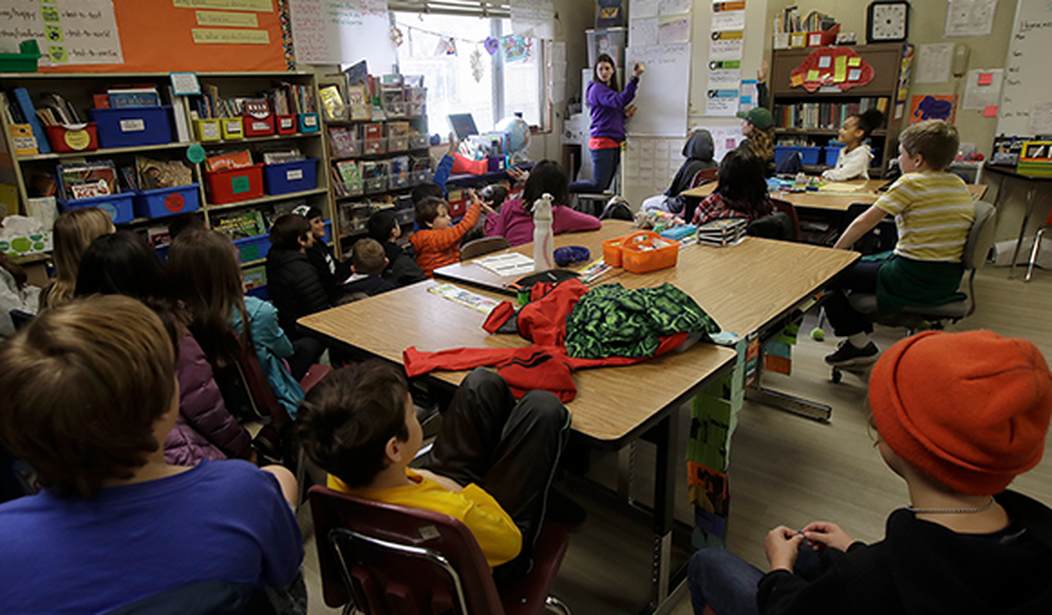Welcome to Bizarro World, otherwise known as NBC “Think”. In an essay NBC published last night from Christina Wyman, parents want to have children “indoctrinated” while schools want to free their minds. Wyman decries parental resistance to progressive pedagogy, arguing that parental involvement in education is as dangerous as it would be to have parents in the operating room.
No, I am not kidding:
While the political climate and national involvement in school districts give the phenomenon a broader platform and have more serious ramifications, this behavior is nothing new. Parents have always tried to interfere with curricula, as I observed when teaching middle school in the mid-2000s. Even then there was no shortage of parental input about the content of my instruction, from books to test questions. Part of the problem is that parents think they have the right to control teaching and learning because their children are the ones being educated. But it actually (gasp!) doesn’t work that way. It’s sort of like entering a surgical unit thinking you can interfere with an operation simply because the patient is your child.
Teaching, too, is a science. Unless they’re licensed and certified, parents aren’t qualified to make decisions about curricula. In fact, parental interference can actually hinder student advancement. An educator’s primary goal is to teach students to think. Parents who attempt to influence curricula with their personal opinions, ideologies and biases hinder that goal.
As long as we’re using medical analogies, that’s the most pernicious case of projection I’ve seen in a long time. This is a Stage 4 case of projection, one in which delusions of credentialism take over and the outward symptoms of elitism and totalitarianism become impossible to mask. In other words, Wyman’s a goner.
The rest of us have grown slowly immune to these arguments, however, because we have been thoroughly exposed to the indoctrination tactics of progressive pedagogy. Wyman’s hoping to defend the CRT-drenched curricula in use in most public schools by claiming it’s only opening the minds of children. Instead, it imposes CRT assumptions about “systemic racism” and never allows for any questioning of that core belief — not by students, and certainly not by teachers who got credentialed in institutions that forced them to “confess their privilege” as conditions of graduation.
That process of indoctrination of educators has gone on for well over a decade. In 2009, for instance, the University of Minnesota got caught not only imposing such ideological systems as a prerequisite for graduation for education majors, but as a prerequisite for enrollment:
The college’s Teacher Education Redesign Initiative includes several task groups. The Race, Culture, Class, and Gender Task Group has some very specific ideas about “cultural competence,” as described in its final report (later amended) of July 16, 2009. Although the task group admits “that cultural competence remains hard to define and that current definitions lack consensus,” the group emphasizes:
Nonetheless, let there be no doubt that we consider cultural competence to be an indispensable characteristic of all beginning teachers and, hence, an obligatory goal of teacher education. In fact, we believe that the following outcomes that we present should serve as an overarching framework from which beginning teachers frame the rest of teacher education courses and practice.
Here are the key excerpts regarding how the group describes the “obligatory,” “indispensable” features of “cultural competence” on the level of “Self”:
Our future teachers will be able to discuss their own histories and current thinking drawing on notions of white privilege, hegemonic masculinity, heteronormativity, and internalized oppression.
Future teachers will understand that they are privileged & marginalized depending on context … It is about the development of cultural empathy, if you will. Teachers first have to discover their own privilege, oppression, or marginalization and also are able to describe their cultural identity.
College students hoping to be teachers had to first pass this Cultural Revolution-esque process before taking the first step in learning to teach anything. And while the U of M publicly promised to review this and step it back, there hasn’t been any indication that they — or any other teaching university — stopped making this a requirement. Instead, this ideological indoctrination has spread in the years since, until only recently parents began to take notice of it. This prompted a parental revolt in the normally liberal environs of Northern Virginia, set a fire in the rest of the state, and when Terry McAuliffe tried out Wyman’s argument, he ended losing an election he should have easily won to Glenn Youngkin.
Now Wyman adopts McAuliffe’s argument and takes up a notch, framing parental involvement as some form of extremism. Why? Wyman doesn’t want any accountability for education’s failures, that’s why. Public school performance has only gotten worse over the last generation despite the US spending near the top the of the developed world per student. The more schools have focused on “cultural competency” and ideological indoctrination, the worse they have performed on core competencies such as math, language skills, and science.
The American public school system was built on accountability, especially local accountability. Communities elect school boards for that purpose, and school board meetings — where parents demand accountability — is one of the few town-meeting exercises of democracy left in regular use across the US. Small wonder, then, that the same people who demand that parents butt out of education suddenly want to claim that parents are domestic-terrorists-in-the-making when they attend school-board meetings.
Parents need to rethink this structure. It’s long past time for them to organize to redeploy taxes back into their hands so that they can choose schools for their children outside of the ideological monopolies of public school systems. School choice will give them their best hope for educational accountability — and perhaps the competition from private schools will force educators in public systems to be a bit more open to parental involvement as an alternative to being out of work entirely.








Join the conversation as a VIP Member